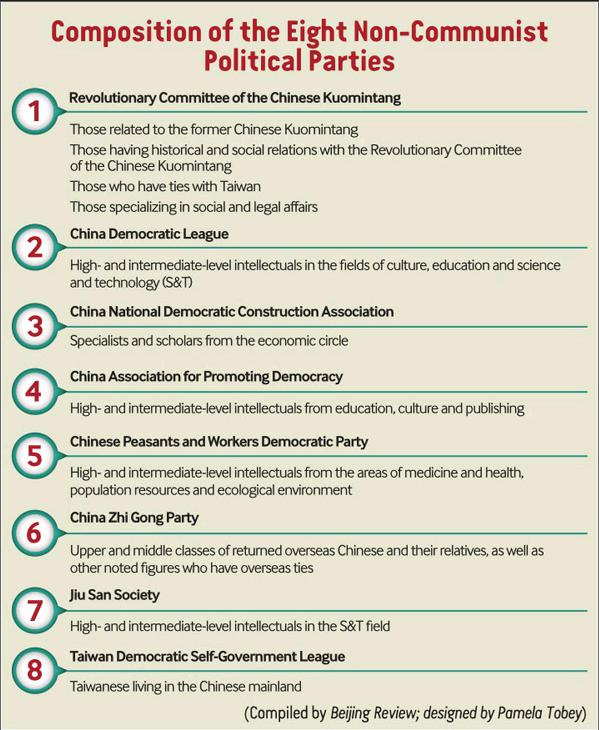Toward One Direction
2018-01-22ByLuYan
By+Lu+Yan


Wu Weihua, a biologist at China Agricultural University and director of the National Key Laboratory of Plant Physiology and Biochemistry, was elected as chairman of the Central Committee of the Jiu San Society, one of the Chinese mainlands eight non-Communist political parties, on December 7, 2017.
“Under the leadership of the Communist Party of China (CPC), the Jiu San Society will strive to contribute to securing victory in building a moderately prosperous society in all aspects and realizing Chinas rejuvenation,” said Wu at the 11th National Congress of the Jiu San Society after he was elected.
The Jiu San Society was founded in 1946.“Jiu San” refers to the numbers nine and three in Chinese. The name was chosen to commemorate the victory in the Chinese Peoples War of Resistance Against Japanese Aggression (1931-45) and the World AntiFascist War on September 3, 1945. Its predecessor was a symposium where Chinese progressives exchanged political views and discussed the political situation as the nation fought against Japanese invaders.
Now the organization is composed mainly of high- and intermediate-level intellectuals engaged in science, technology, culture, education, and medical and health work. As of June 2017, the society had 167,000 members, among whom 61 are academicians of the Chinese Academy of Sciences (CAS) and the Chinese Academy of Engineering. More than 2,300 are deputies to peoples congresses at various levels, and more than 11,800 are political advisors.
The 62-year-old Wu is also an academician of the CAS. Born in north Chinas Shanxi Province in 1956, Wu spent his childhood in a village and did farm work after graduating from high school. He developed an interest in biology and pursued his undergraduate study at Shanxi University and graduate study at the CAS. In 1991, Wu got his doctoral degree in Plant Biology at Rutgers, the State University of New Jersey, the United States. After that, he came back to the motherland and contributed a lot to improving Chinas crop production with his research and study. In November 2017, Wu received the Tan Jiazhen Life Science Award, one of the most influential awards in life sciences in China.
“The Jiu San Society should be developed into a participating political party of socialism with Chinese characteristics that is fi rmer in ideology, more solid in performing its duties and stronger in organization,” Wu said.
Apart from the Jiu San Society, there are seven other non-Communist political parties—the Revolutionary Committee of the Chinese Kuomintang, China Democratic League, China National Democratic Construction Association, China Association for Promoting Democracy, Chinese Peasants and Workers Democratic Party, China Zhi Gong Party and Taiwan Democratic SelfGovernment League—which have been making endeavors together with the CPC in developing socialism with Chinese character- istics under a political party system featuring multiparty cooperation and political consultation under the leadership of the CPC.endprint
Participation in governance
According to the White Paper on Chinas Political Party System published by the State Council Information Office in 2007, as one of Chinas fundamental political systems, the multiparty cooperation system identifi es the status and functions of the CPC and the eight other political parties on the Chinese mainland in the political life of the state as well as the relations between the parties.
Under the leadership of the CPC, the eight parties participate in and deliberate on state affairs in the following ways: participating in the exercise of state power, consultation on fundamental state policies and the choice of state leaders, the administration of state affairs, and the formulation and implementation of state policies, laws and regulations. Their status and rights as participating parties are protected by the Constitution and other laws.
Before the annual plenary sessions of the National Peoples Congress and the Chinese Peoples Political Consultative Conference(CPPCC), commonly known as the Two Sessions, in 2017, these parties, together with the All-China Federation of Industry and Commerce, submitted over 300 proposals covering various aspects of Chinas development and the peoples well-being such as economy and finance, resources, environmental protection, education, health, poverty alleviation, social services and science and technology (S&T).
For example, the China Association for Promoting Democracy proposed that the nation should promote the use of natural gas as a fuel for heating so as to reduce smog; the China Democratic League suggested that the government pay more attention to childrens nutrition and health in poverty-stricken areas; the Taiwan Democratic Self-Government League stressed that cities should build more infrastructure to support the project of relocating people from poor regions.
Different from both the two-party or multiparty competition systems of Western nations and the one-party systems practiced in some other states, the political system on the Chinese mainland was born in Chinas revolutionary struggles of the 20th century and has since been developed through decades of practice of socialist construction and reform. It is a basic political system that suits the conditions of the Chinese mainland.
Under this system, the CPC and the eight parties work closely together and supervise each other. The CPC rules the nation, and these parties participate in state affairs according to the law. The system accords with the system of peoples congresses to ensure that the people are the masters of the state.endprint
“It is a socialist political party system with Chinese characteristics, and a key component of Chinas socialist democratic politics,”the white paper said.
A natural choice
The multiparty cooperation system is the result of long-term practice.
China had a prolonged history of feudal- ism before 1840. From 1840 on, Western imperialist powers launched aggressive wars against China. The corrupt and weak feudal ruling class buckled, and China was reduced to a semi-colonial, semi-feudal society. In the following nearly 110 years, the Chinese nation was plunged into a most dangerous situation, and the people had no democratic rights. In the early 20th century, Sun Yat-sen, forerunner of Chinas democratic revolution, turned his eyes to the West for a road that would save China.
In 1911, he led a bourgeois democratic revolution, bringing to an end the autocratic monarchical system that had been in place for several millenniums. With the founding of the Republic of China, Sun introduced a parliamentary and multiparty system in imitation of those in Western nations. Though historically progressive compared with the autocratic monarchy, the bourgeois political system soon collapsed under the onslaught of domestic and foreign reactionary forces and therefore failed to fulfill the Chinese peoples fervent desire for independence and democracy. Sun later concluded that China could not simply copy European and U.S. politics to govern its own society as it was different from those of the West.
During the Chinese Peoples War of Resistance Against Japanese Aggression and the War of Liberation (1945-49), most of the eight political parties were established. They formed a progressive force which was anti-imperialist and patriotic and demanded democracy.
In days of tough struggle, the CPC, founded in 1921, established and developed close relations of cooperation with the eight parties and joined forces with them to fi ght for the nation. Hand in hand they launched a movement against the Japanese invaders and later fought against the policy of dictatorship adopted and the civil war instigated by the Kuomintang and Chiang Kai-shek clique.
While leading the new democratic revolution to victory, the CPC established its core leadership role among the various revolutionary forces. And these parties and democratic personages without party affiliation, through experience in the years of practice and on their own initiative, chose the leadership of the CPC.endprint
The convention of the First Session of the First National Committee of CPPCC in September 1949 marked the formal establishment of the multiparty cooperation system under the leadership of the CPC. It also marked the beginning of the CPC, the non-Communist parties and the democratic personages without party affi liation working together in building the state power of the Peoples Republic of China.
Since then, the multiparty cooperation system has been continuously developed and consolidated in spite of some diffi culties along the road, playing a significant role in the nations political and social life.
“In handling its relationships with other Chinese political parties, the CPC is guided by the principles of long-term coexistence, mutual oversight, sincerity, and sharing the rough times and the smooth, and it supports these parties in performing their duties in accordance with the requirements of the Chinese socialist system for their participation in governance,” said Chinese President Xi Jinping, also General Secretary of the CPC Central Committee, in the report he delivered to the 19th CPC National Congress in October 2017.
Future efforts
At the end of 2017, the eight political parties had their national congresses, which are held every five years. In the process, the parties elected new party central committees and leadership, and delegates heard and deliberated the work reports of their parties central committees, as well as reviewed and approved amendments to their constitutions.
Concerning development in the coming five years, the parties held the same view that they will continue to cooperate with each other in promoting reform and opening up and socialist modernization.
Based on their unique features and focuses, they also came up with a number of plans for future work.
Wan Exiang, Chairman of the Revolutionary Committee of the Chinese Kuomintang, noted that the party will provide services for Taiwanese who want to study, work, and start businesses in the Chinese mainland and make things more convenient for them. And it will also promote exchanges between people across the Taiwan Straits by organizing various activities.
Wan Gang, Chairman of China Zhi Gong Party, said in an interview with Xinhua News Agency that the party will step up its work for returned overseas Chinese and their relatives, and promote friendship between Chinese people and people from the rest of the world.
Moreover, building a strong team of high-caliber personnel is the priority for all these political parties. Wu said that the Jiu San Society will recruit not only famous and well-respected experts and scholars, but also young and middle-aged persons with ability and potential, and build a platform for growth for them.
Notably the new leadership groups of these political parties have a balanced age distribution. Among the 85 newly elected leading members, 48 were born in the 1950s and 37 in the 1960s, with an average age of 58. About 70 percent of them have a doctors degree.
“Its an honorable responsibility for me, bestowed by the nation and the time. I will do my best to follow in the steps of my predecessors,” said 58-year-old Cai Dafeng, newly elected Chairman of the China Association for Promoting Democracy, who is also the youngest among the eight newly elected chairpersons.endprint
